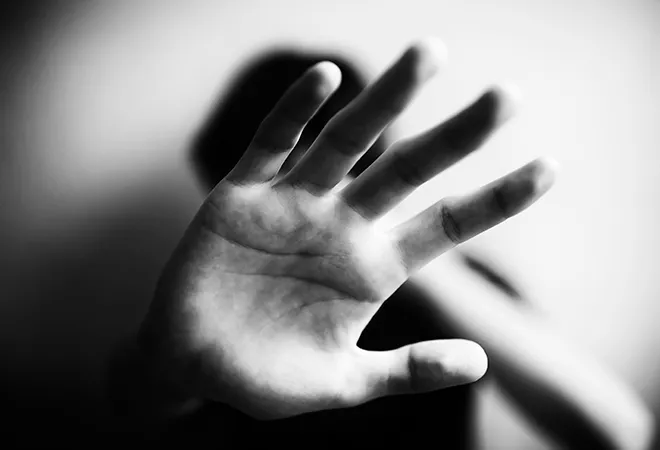
In the run-up to the announcement of nationwide lockdown starting 00:00 hours of 25 March 2020, there were several areas where the government failed to craft a strategy to address the possible fallouts. One such aspect that was completely out of their purview was the way out to deal with incidents of domestic violence (DV) in the country. The question on the checks and balances that needed to be in place that the victim of DV could resort to, was unheeded.
The term ‘domestic violence’ (DV) is used in many countries to refer to intimate partner violence (IPV), but it also encompasses child or elder abuse, or abuse by any member of a household. According to the World Health Organisation, one in every three women across the globe experience physical and/or sexual violence by an intimate partner or sexual violence by any perpetrators in their lifetime: at least 30% of all women who have been in a relationship have experienced physical and/or sexual violence by their intimate partner.
It has been seen that violence against women tends to increase during every type of emergency, including epidemics. This article corroborates this and provides insights into the increased evidences of domestic violence in the households locked down for combatting COVID19.
Increase in domestic violence: The viciousness of COVID19
Fueled by mandatory stay-at-home rules, social distancing, economic uncertainties and anxieties caused by the coronavirus pandemic, DV has increased globally. For instance, countries like China, United States, United Kingdom, Brazil, Tunisia, France and Australia and many others have reported cases of increased domestic violence and IPV or intimate partner violence. India is also showing symmetrical trends, especially when it is infamous for being the fourth worst country (after United Arab Emirates, Qatar and Saudi Arabia) for gender equality (ranked by perception). According to the Crime in India Report 2018, published by the National Crimes Research Bureau (NCRB), every 1.7 minutes a crime was recorded against women in India, every 16 minutes a rape was committed and every 4.4 minutes a girl is subjected to domestic violence.
The number of cases reported might not be proportional to the actual rise in the number of DV cases. This is because the woman locked down with the abuser does not get the access to a mobile phone or the space and time, with limited access to financial resources and social networks or even the courage when she could call up for help.
Within a few days of the lockdown, the National Commission of Women (NCW) noted a rise in the number of DV and IPV complaints received via emails. The NCW Chairperson believed that the real figure is likely to be more since the bulk of complaints come from women in the lower strata of society who send their complaints by post. In March and up to 5 April, 2020, the NCW received 310 grievances of DV. During this period, a total of 885 complaints were received by NCW for other forms of violence against women (example: bigamy/polygamy; denial of maternity benefits to women; dowry deaths; harassment of married women/dowry harassment; outraging the modesty of women/molestation; rape/attempt to rape; right to live with dignity; sexual assault and; sexual harassment). Several women’s rights organisations have also been receiving numerous DV complaints since the enforcement of the lockdown.
The number of cases reported might not be proportional to the actual rise in the number of DV cases. This is because the woman locked down with the abuser does not get the access to a mobile phone or the space and time, with limited access to financial resources and social networks or even the courage when she could call up for help. In other words, all options of escape for the former from their situation of despair are impaired. Thus, their intensity of the impediments she would normally face has been exacerbated by the pandemic and the lockdown.
While the chairperson of NCW has urged women to contact police or reach out to state women commissions if they face domestic violence, it must be noted that there might be chances where the police are delayed in such rescues. This is because they are already handling challenges of enforcing the lockdown, ensuring delivery of essentials to the vulnerable sections and in several places assisting the health workers in the discharge of their duties. Further, women have felt additionally unsafe in approaching the police because they think that if their husbands are arrested, they could be harassed by in-laws, or once their husbands return, they would be tortured even more.
While the chairperson of NCW has urged women to contact police or reach out to state women commissions if they face domestic violence, it must be noted that there might be chances where the police are delayed in such rescues.
With partners and children potentially trapped at home during the COVID19 lockdown, the rate and intensity of abuse could get even worse and extend to child abuse. Repeated acts of physical violence, such as slapping, hitting, kicking and beating; sexual violence, including forced sexual intercourse and other forms of sexual coercion; emotional (psychological) abuse, such as insults, belittling, constant humiliation, intimidation (e.g. destroying things), threats of harm, threats to take away children; controlling behaviours, including isolating a person from family and friends; monitoring their movements; and restricting access to financial resources, employment, education or medical care, often results in depression, and panic attacks and other anxiety disorders and even suicides. It often has lasting impacts on the survivors as research suggests that the memory of abuse persists long after the violence has stopped. This often results in chronic health problems and developing risks of many diseases that arise from prolonged stress.
DV in perspective: Way forward
In the critical situation of trying to combat a pandemic, increased number of women are faced with the plague of DV within their households. It must not come as a surprise because domestic violence topped in the category of violence against women in 2018. As per the data, a total of 89,097 cases related to crimes against women was registered across India in 2018. The figures indicate not much has improved when compared to the figure of 86,001 cases registered under this head in 2017. The crime rate per lakh women population was 58.8 in 2018 in comparison to 57.9 in 2017.
The National Family Health Survey (NFHS-4), 2015-16 highlighted that 30% women in India in the age group of 15-49 experienced physical violence since the age of 15. The report suggested that among married women experiencing physical, sexual or emotional violence, an alarming 83% claimed that their husbands were the main perpetrators of such forms of abuse, followed by abuse from the mothers (56%), fathers 33% and siblings 27% of the husbands. The major crimes reported by women in India are — cruelty by husband or relatives 32.6%, assault on women with intent to outrage her modesty — 25%, kidnapping and abductions 19% and rape 11.5%.
The above crime statistics are unable to capture the data on violence against women in its entirety. This is primarily due to the prevalence of orthodox social norms and the stigma that is placed on survivors of sexual violence, DV which leads to such cases being grossly underreported. The report also shows that unemployment and alcoholism of the male partner are highly associated with DV on women.
In its combat efforts against COVID19, the government must allow civil society organisations, counsellors, mental health organisations and providers to come to the rescue of the women facing domestic violence.
In addition to the direct health threat posed by the coronavirus, the pandemic and restrictions aimed at checking its spread have heightened anxieties, from apprehensions on catching the coronavirus, financial worries to social concerns. There is also a concern that violence would further increase with job losses and other economic pressures. An added challenge has been the importance of intertwined negative psychosocial impact on mental health of women.
In the attempt to flatten the COVID19 curve, women’s equality and physical and mental health seems to have suffered a collateral damage. From the discussion above, the government overlooked the need to formally integrate domestic violence and mental health repercussions into the public health preparedness and emergency response plans against coronavirus. In fact, the Sustainable Development Goal (SDG) 5 that seeks to “eliminate all forms of discrimination and violence against women in the public and private spheres, and to undertake reforms to give them the same rights to economic resources and access to property by 2030,” is being enormously compromised.
Members of the community must be sensitised of the increased risks to women’s health and life in the lockdown days, and they must develop the ethos to condemns violence and shoulder the responsibility of offering all possible assistance to ensure their safety. In its combat efforts against COVID19, the government must allow civil society organisations, counsellors, mental health organisations and providers to come to the rescue of the women facing domestic violence. Reaching out to women in distress and the need to address the various forms of violence against women needs to be classified as an “essential service” by the government. Finally, the perpetrators of domestic violence and IPV must be brought to trial and repeat offenders must be dealt with strictly as per the provisions of law.
The views expressed above belong to the author(s). ORF research and analyses now available on Telegram! Click here to access our curated content — blogs, longforms and interviews.




 PREV
PREV




